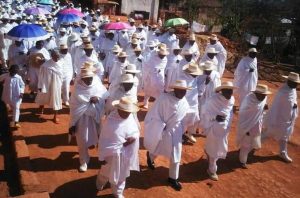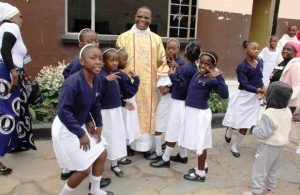He was a 28-year-old aid worker who was gunned down in Somalia in 1993. He had worked on missions in Liberia and for the UN in Somalia. A passionate opponent of the illegal arms trade he was killed by bullets from a foreign rifle.
Sean was fascinated by Africa. When his first application to work as a volunteer on the Salesian missions in Liberia was rejected, he did not give up. Having been told by Father Joe Brown, from the Liberian Arthur Barclay Technical Institute, that he would be more useful if he gained qualifications in England, in 1982 he went to Birmingham University to read Geography and Physical Education. After graduating, Sean taught at the Chertsey Salesian school for a time before approaching Fr Joe Brown again. This time there was no hesitation and soon Sean was on his way to Liberia.
Arriving in 1989 he was assigned to St Francis School in Tappita, a secondary school of about 950 pupils. He was soon up to his eyes in work and revelling in it. One day he went with Br Donald MacDonald to Monrovia to collect a new pickup truck for Tappita. As soon as he got back, he organized a talent show at which the children were invited to perform anything of their choice.
Sean kept the pace of things cracking along giving plenty of prizes to encourage participation. Talent show over, he then staged an open-air passion play for the school and village. Sean had no fear of failure in any enterprise he undertook. An old adage says, ‘The man who never made a mistake, never made anything’. The children were all that mattered. He devoted himself to them, organizing table tennis, football, basketball and other activities.
After a break home for Christmas, Sean returned to a completely different Liberia. The President had been overthrown by rebels and a civil war was raging. Food was short, and the UN made St Francis School a food distribution centre. Sean co-ordinated the effort. The school was attacked and the children scattered into the bush. Many were caught and coerced into the war as child soldiers.
Sean then worked for the UN Disaster Relief Office in Monrovia as a logistics officer, supervising the distribution of food along the Guinea-Liberia border. It was a nomadic life but he made the most of the opportunities it afforded to visit the areas where the young people liked to hang out. He was deeply shocked by the cruelty he witnessed, as also by the corruption which blinded men to all considerations of pity and compassion.
One million people were refugees and half a million were sick and hungry. In a letter home Sean described how he asked the Guinean chief of customs, who had been caught stealing fifty sacks of rice intended for the refugees, why he had stolen. Accused of insulting the Guinean government Sean was promptly expelled from the country.
Posted back to Monrovia, Sean found 400,000 refugees in a desperate plight. In a letter to the Salesian Provincial in England, Sean wrote, “It’s not easy seeing one of the kids you taught to play football, dressed in oversized army gear, shouldering a weapon of destruction, come up crying to you, because he now realizes he’s trapped in a ghastly, crazed environment.” Everything he had worked so hard for, all the effort he had invested in these youngsters, had been brought to nothing by the greed and power seeking of evil men. It seemed more than he could bear.
Sean was thrown into jail because he helped a former pupil. He began to realize the perils of daily life. Although aware that his own life was in danger, Sean had the courage to go to Prince Johnson, the notorious rebel leader, to ask permission to take food into a territory controlled by the warlord’s soldiers. Johnson was a forbidding man, cruel, bad-tempered and unpredictable — described as a ‘psychopath’s psychopath’, it was he who ordered the butchering of the Liberian leader, Sergeant Samuel Doe, himself no angel.
By 1991, Sean and his team were responsible for a highly organized food distribution system, providing 750,000 people with rice, oil and beans through 163 distribution centres.
In one terrifying incident Sean upset the guards at a road block, and was neaten with fists and rifles and kicked to the ground. He was saved when one of the young guards shouted, ‘Stop, you can’t do that, that’s our teacher, Mr Sean.’ The intervention saved him. Bruised and bloodied Sean remained with his food convoy until he was eventually allowed through the road block. He stayed with the food for three more days to ensure it went to starving people and not the gunmen.
Weakened physically by the beating, threatened by the rebel leader, Sean was no longer welcome in Liberia. His life was in serious danger. His superiors decided it was time for a break in England before going to a new posting elsewhere in Africa.
In September 1992 Sean was posted to Somalia, then one of the most lawless places in Africa. At once he put his skills to work, getting food away from the warlords to the areas where it was most seeded. He spoke in radio and television interviews against the warlords and the terror which they were spreading with their killings.
An implacable opponent of the arms trade, Sean told of a gun fight between two families over a stolen camel. During the fight thirty-five people were killed. At the end of the mayhem he came just walked off. As Sean pointed out, without guns there would have had a few black eyes and bruises, but that was all.
Sean enjoyed a break over Christmas 1992 when he joined his parents and sisters in Nairobi, Kenya for a holiday. Soon after his return to Kismayo, Somalia, Sean was walking back from his office to his house when he was shot twice from behind by a hired contract killer. He died instantly; twenty-eight years old.
(David Burke)






